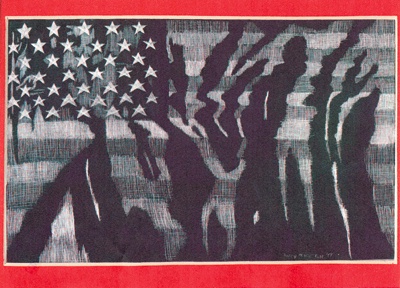All Nonfiction
- Bullying
- Books
- Academic
- Author Interviews
- Celebrity interviews
- College Articles
- College Essays
- Educator of the Year
- Heroes
- Interviews
- Memoir
- Personal Experience
- Sports
- Travel & Culture
All Opinions
- Bullying
- Current Events / Politics
- Discrimination
- Drugs / Alcohol / Smoking
- Entertainment / Celebrities
- Environment
- Love / Relationships
- Movies / Music / TV
- Pop Culture / Trends
- School / College
- Social Issues / Civics
- Spirituality / Religion
- Sports / Hobbies
All Hot Topics
- Bullying
- Community Service
- Environment
- Health
- Letters to the Editor
- Pride & Prejudice
- What Matters
- Back
Summer Guide
- Program Links
- Program Reviews
- Back
College Guide
- College Links
- College Reviews
- College Essays
- College Articles
- Back
Only the Middle Class Will Revolt
The revolutions I’ve observed, especially in the last few years in Brazil, the Middle East, Turkey, etc., they’ve consisted almost entirely of middle and lower-middle class participants on the side of the opposition. This is not coincidental, but systematic.
It’s quite obvious that in any economic system that acknowledges its existence, the upper class will never revolt. This is common sense; if you’re within the upper class, you’ve attained your luxurious lifestyle from the system. In certain systems, the upper class doesn’t need to protest; they simply receive in response to demand. This could be because they are either seemingly vital to the smooth flow/continuation of the system, have the influence and power of manipulation to twist the establishment in their favor, or both. None of this is particularly unique to the current time period.
The lower class also will not revolt, however (it seems to me) that these reasons are not quite as clear. The first possibility would be that the lower class is in a constant struggle for survival; those who are struggling cannot afford a collapse of the system, and simply ceasing efforts can mean life or death (for instance, job searching for the unemployed).
One major factor in this fight to survive is government assistance. Look at the two mainstream beliefs regarding this. Conservative Republicans see it as counterproductive to the flow of Capitalism, and leads to the creation of a welfare state. Citizens will have no motivation to seek work and contribute to the flow, and become comfortably reliant of government. Assuming their vision is accurate, the lower class will pick the current system over a reformed one for the same reason as the upper class; the establishment has created a “comfortable” living for them.
On the side of the Liberal Democrats, welfare is seen as something to boost those too far under, upwards. This is done so they may find work and continue to survive during the search. In the liberal vision, welfare is essential to the human survival of the lower class. However, this, in essence, is also survival. If this is true, the Lower Class cannot risk an overturning of the system; their life depends on it.
The second possibility aside from government aid is lack of resources. In wealthier nations, the Medias portrayal of what happens in government is seen through almost every form of mass communication. The superficial details of government operations are only kept from those in the worst of financial situations. In not-so-wealthy or repressive countries, citizens, especially the lower and lower-middle classes are kept in the dark completely.
The last possibility is that the government takes little notice of those of the neediest. A large and nearly unanimous call for reform from the lower class, if it were to arise, could be easily ignored. In the eyes of policy makers, the poor have no right to complain.
This is why the middle class will be the reformers. If their systems were to capitulate and a new one is put in place, they would simply take the place of the upper class. In countries such as the United States, Britain, and other wealthy European countries, access to external government information is readily available with just a short time doing research.
May it be said that I’m excluding a number of factors, such as influence of outside nations and the presence of radical ideologies. In revolutions such as the American Revolution and the early stages of the Arab Spring uprisings, it’s the middle class who will take charge.

Similar Articles
JOIN THE DISCUSSION
This article has 0 comments.
